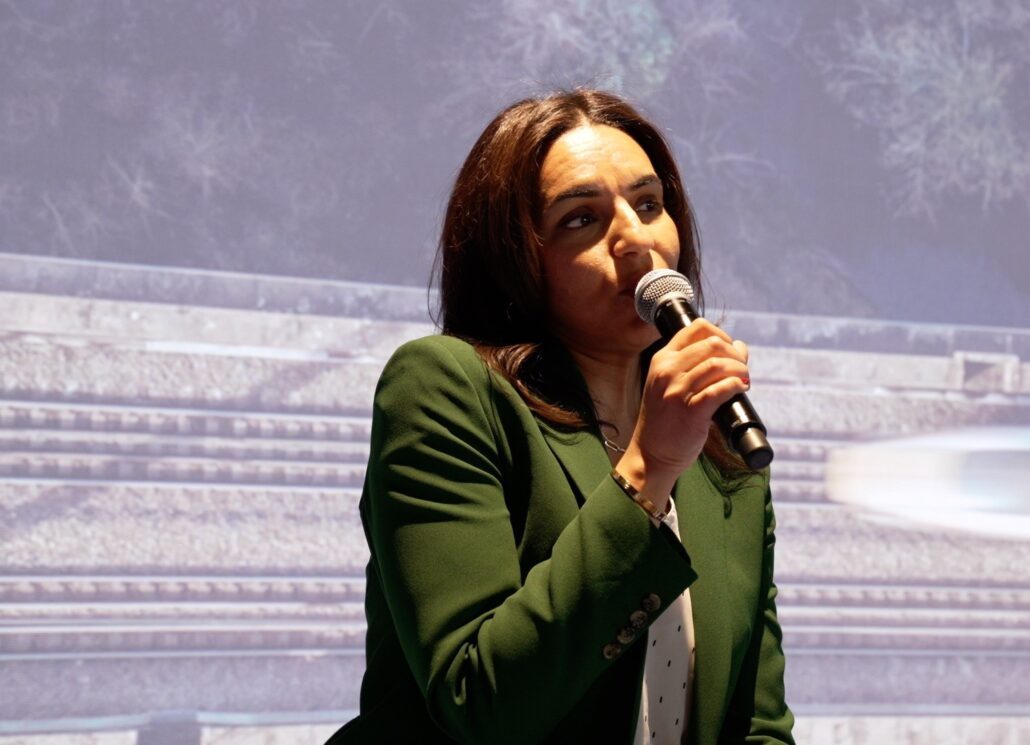
Climate Perspectives interview with Basma Eissa new head of policy, ESG and sustainability at FIDIC.
Basma Eissa is the new head of policy, ESG and sustainability at FIDIC, the International Federation of Consulting Engineers. She spoke to Andy Walker for Climate Perspectives about her role and why she thinks the industry needs to improve its rate of progress towards net zero.
“Achieving net zero is not just important, it is imperative for the global infrastructure sector,” says Basma Eissa. That’s why it’s a key part of FIDIC’s work, especially given that the sector plays a critical role in exacerbating climate change. “The infrastructure industry is responsible for a significant portion of global emissions and at FIDIC we view the pursuit of net zero as a crucial driver of innovation and sustainability. Achieving net zero is not only about mitigating the risks and complying with evolving regulations, it’s also about seizing opportunities and opening pathways for technological advancements, new business models and financial strategies that can drive economic growth in a sustainable manner,” says Eissa.
She cites the growing market for green bonds and sustainable investment as evidence of this and also the increased appetite for tech solutions like digital twins, which she says reflects a strong appetite from investors for ventures that support environmental goals “The shift towards net zero is also reshaping skill sets in the infrastructure sector, with a growing demand for professionals who are also adept at sustainability practices and policies. So, this evolution is creating exciting possibilities and continuous learning opportunities,” she says.
I ask Eissa whether companies are embracing these areas and delivering on their sustainability promises. “Commitment to ESG and sustainability has dramatically shifted from being a niche interest to being a core business strategy for many companies across all sectors. There is a noticeable increase in both the adoption of ESG principles and a genuine effort by companies to meet their sustainability commitments,” she says. “The increase in regulatory requirements and growing expectations from investors, consumers and different stakeholders has all pushed companies to not just embrace ESG and sustainability but to integrate them into their operations and while there is still room for improvement, the momentum is positive,” says Eissa.
I ask her about the dangers of greenwashing as companies and organisations look to leverage their environmental credentials in the race to appear greener and more progressive. “Combatting greenwashing is absolutely crucial. Sustainability and ESG must be deeply embedded within the operational fabric of any company, so at the heart of this strategy is enhanced transparency. Companies need to go beyond setting ambitious goals and must clearly report their actions and outcomes. We have lots of established frameworks like the GRI (Global Reporting Initiative) and the Sustainability Accounting Standards Board and also independent third-part verification, which reinforces trust by confirming that a company’s sustainability claims are grounded in real achievements. Strong regulatory enforcement is also essential, which must include imposing penalties for deceptive claims,” says Eissa.
We turn to climate justice and the need to ensure that communities around the world are not disadvantaged from the dash to net zero. “We tend to forget the ‘s’ in ESG and the social aspect. Climate justice is fundamental to achieving net zero because it means that no community, especially the most vulnerable, is left behind. We need to champion policies that are rooted in fairness and advocate for regulations that not only aim to lower emissions, but also address socio-economic disparities. We also need to promote access to green technologies and sustainable infrastructure and help to ensure that the benefits of a green economy are widely distributed. Inclusive engagement here is crucial, as this inclusivity ensures that diverse perspectives are heard and acted upon, so strategic partnerships between organisations like the UN and the multinational development banks are really crucial in this regard,” Eissa says.
Navigating a path around those key stakeholders is a key challenge for Eissa and FIDIC, especially negotiating the complex and time-consuming policy environments of different countries. “Developing and implementing policies can be a lengthy process involving multiple stages of negotiations and approvals and this often extends the time it takes to kickstart projects and make critical decisions. The extensive coordination required across different governmental and organisational layers adds another level of complexity and aligning multiple stakeholders with varying interests and goals requires a lot of patience and persistence, so you need a deep understanding of the political and cultural nuances at play,” Eissa tells me. Despite those challenges, Basma says the opportunity to work with a diverse range of cultures and experts is profoundly rewarding.
She is also clear that the world needs to move faster on its decarbonisation journey. “Globally, we are not advancing quickly enough. We need more global cooperation, as climate change knows no borders and international partnerships can help streamline efforts and share innovations and resources more effectively. Innovation must be accelerated, so we need more investment in research and the rapid deployment of technologies like renewable energy, digital solutions and carbon capture. Financial mechanisms need to align with these goals and we need increased collaboration between different stakeholders, governments, investors and industry practitioners,” she says.
Despite these challenges, Eissa has hope for the future. “I remain realistically optimistic about the future because the challenges we face also present us with unique opportunities. It’s important to retain a positive outlook while driving forward with determination but it is also crucial for everyone, regardless of their role or industry, to recognise the impact they can have. Sustainability isn’t just for those directly working in ESG or sustainability roles – you can implement and incorporate sustainability in every role and every aspect of a business. Even small actions can have a big collective impact. My message is to stay motivated because every small step contributes to a giant leap towards the net zero future that we all want to see,” says Eissa.
*You can listen to the full interview on our Spotify channel here.